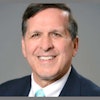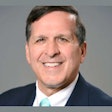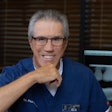I arrived on my first day at a new dental practice bright-eyed, bushy-tailed, and ready to conquer the world. I had my best outfit on, my hair was perfect, and my confidence was a solid 10/10. Fast-forward two hours later and there I was, slumped in front of a computer, confidence shattered, trying desperately not to cry.
 Lisa Newburger.
Lisa Newburger.
See, their software was like something from another planet. Not only did I not know how to make an appointment, but it also demanded that I enter a billing code just to proceed.
Diagnosis codes? Billing codes? I didn’t even know where to find a billing code. I just sat there, frozen, thinking, "If I type in literally anything, I’m probably going to accidentally sell someone a crown they don’t need."
That moment -- sitting paralyzed in front of that computer -- was a turning point for me. I did the only thing I could do: I went old school ... paper, pen, and prayer. I meticulously kept track of everything by hand and had the dentist review it all with me at the end of each day.
Was he thrilled about it? No. Was he desperate for help and willing to deal with my "system?" Absolutely.
It was not the grand professional debut I had envisioned. But here’s the thing: This feeling of being overwhelmed is totally normal in dentistry (and, honestly, in almost any new job). There’s a saying that it takes a year to really know your job. I used to roll my eyes at that. Now? I say, “Only a year? That’s adorable.”
Let’s also talk about the tears. Oh, the tears.
Early in my career, there were a few times I cried, not from sadness but from pure, boiling frustration. Maybe it’s a woman thing. Maybe it’s a human thing. Either way, nothing is more infuriating than feeling your body betray you with silent tears when all you really want to do is flip a desk. (Spoiler: Don’t flip the desk. It never ends well.)
Do I have the secret sauce to prevent breakdowns? Nope. Sorry. It's called life experience, and it's earned the hard way. Over time, my confidence and emotional armor thickened -- not because I never messed up, but because I messed up, survived, and got smarter each time.
When you think about it, it’s our failures that build self-esteem, not the easy wins. Sure, succeeding feels great. But it’s the faceplants, the wrong billing codes, the awkward conversations with your boss that stick with you. Those are the moments that force you to grow.
You might think that sounds a little dramatic. But tell me, when you make a mistake, do you shrug it off immediately? Of course not. You stew. You replay it in your mind 400 times. You maybe even Google, "How to change your identity and move to a remote village in the Alps." And eventually, you realize that it wasn’t the end of the world.
Here’s the real question: How do you treat yourself after you mess up?
There was a time when I sent the wrong information to one office instead of another. Yes, I caught and fixed it before the damage was permanent, but the office manager still called and asked how I was going to ensure it didn’t happen again.
I explained my action plan. What I didn’t do was offer excuses (even though at the time, I had real personal challenges going on). Excuses don’t fix mistakes, actions do.
Was it hard not to feel talked down to? Oh, 100%. But I had a choice, I could stew in humiliation, or I could figure out a system to avoid that mistake in the future. Spoiler alert: Action beats rumination every time.
So, what about you? When you mess up, do you beat yourself up for days? Or do you dust yourself off, make a plan, and keep it moving?
Because here’s the truth: You are going to mess up. You are going to feel overwhelmed sometimes. And you do make your own destiny -- one billing code (and one nervous breakdown) at a time.
Me? I choose growth. And if that means a few tears along the way, well, at least they moisturize the skin.
Lisa Newburger is a talent acquisition specialist with Your Partner in HR, where she puts her superpower of connecting people to work. She has a master's degree in social work from Loyola University and a bachelor's degree from Ohio State University. Newburger is a licensed independent social worker supervisor. She has published more than 300 articles and has earned awards such as Toastmaster of the Year and Distinguished Toastmaster.
The comments and observations expressed herein do not necessarily reflect the opinions of DrBicuspid.com, nor should they be construed as an endorsement or admonishment of any particular idea, vendor, or organization.



















